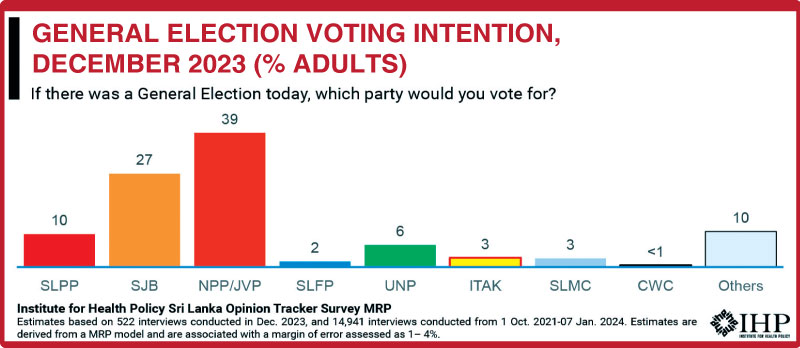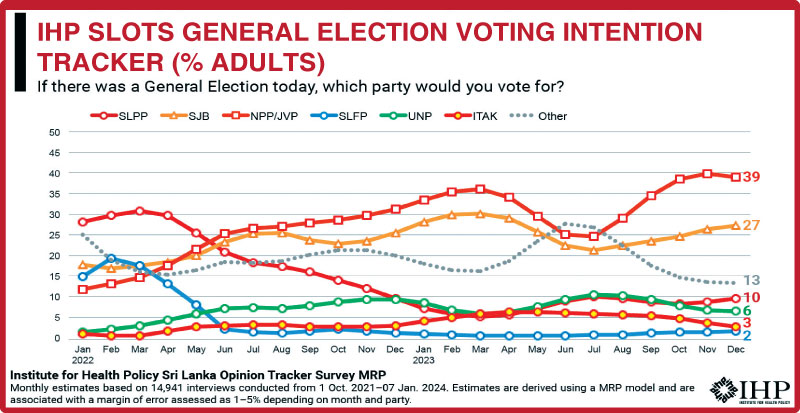Wednesday Feb 25, 2026
Wednesday Feb 25, 2026
Saturday, 27 January 2024 01:57 - - {{hitsCtrl.values.hits}}


|
NPP leader Anura Kumara Dissanayake
|
The latest estimates from IHP’s revised SLOTS MRP model (revised 01/2024) show that the NPP/JVP maintains a lead in General Election voting intent with 39% of Sri Lankan adults in December 2023.
This was significantly ahead of the SJB on 27%, the SLPP on 10%, the UNP on 6%, and ITAK and SLMC on 3% each. The December estimates are provisional and are associated with a margin of error of 2.0–3.5% for the four leading parties.
The revised IHP SLOTS model estimates reveal more clearly that the current NPP/JVP lead is based on a continuous rise in support since early 2022. The SJB has also increased its support, but a slower pace, lying in second place since mid-2022. The December 2023 estimates also confirm a decline in support for the UNP since July 2023, with SLPP support holding steady.
These results are based on a major revision of the IHP SLOTS MRP model, intended to smooth monthly changes and reduce monthly fluctuations due to sampling noise. Unlike previous months which highlighted voting intent in likely voters, these estimates are for all adults. IHP is working on improving its likely voter model and will resume release of voting intent in likely voters in a future update. But it should be noted that differences in voting intent shares between all adults and likely voters have typically been 1–2% for most estimates in the past two years.
This December 2023 update is based on 14,941 interviews conducted with adults across Sri Lanka since Oct. 2021, with 522 interviews carried out in Dec. 2023. IHP’s SLOTS MRP methodology first estimates the relationship between a wide variety of characteristics about respondents and their opinions – in this case, ‘If there was a General Election today, which party would you vote for– in a ‘multilevel statistical model’. It then uses a large data file that is calibrated to the national population to predict voting intent in each month since Oct. 2021, according to what the multilevel model says about their probability of voting for various parties (‘post-stratification’) at each point in time. The multilevel model was estimated 100 times to reflect underlying uncertainties in the model and to obtain margins of error.
IHP is an independent, non-partisan research centre based in Colombo, Sri Lanka. The SLOTS lead investigator is Dr. Ravi Rannan-Eliya of IHP, who has trained in public opinion polling at Harvard University and has conducted numerous surveys over three decades.
SLOTS combines interviews from a national sample of adults (ages 18 and over) reached by random digit dialling of mobile numbers, and others coming from a national panel of respondents who were previously recruited through random selection and face-to-face interviews. IHP estimates voting intent using an adaptation of Multilevel Regression and Post-Stratification (MRP), with multiple imputation to account for uncertainties in its modelling, exploiting data from all SLOTS interviews to estimate voting in a particular month.
The December 2023 MRP estimates are based on 522 interviews conducted in December 2023, and 14,941 interviews conducted overall from 1 October 2021–7 January 2024, with a margin of error assessed as 0.8–3.4% for the NPP/JVP, SJB, UNP, SLPP, SLFP, ITAK, SLMC, CWC, and 4% for the “other” parties.
The December update uses a revised model, so estimates will be smoother and will differ a little from previous estimates. A total of 100 stochastic simulations were used in the modelling to estimate margins of error.
MRP is a method that is increasingly used by polling firms in other countries to leverage small samples, most notably by YouGov which used it to forecast results of the UK Brexit referendum and recent UK general elections. All estimates are adjusted to ensure the sample matches the national population with respect to age, sex, ethnicity, socioeconomic status, education, geographical location, and voting in the 2019 Presidential and 2020 General Elections.
The SLOTS survey has previously been funded by the Neelan Tiruchelvam Trust, the UK
National Institute for Health and Care Research (NIHR), The Asia Foundation in Sri Lanka, and others. Current fieldwork is financed by the IHP Public Interest Research Fund and others. The sponsors play no role in the study design, analysis, or interpretation of findings. Furthermore, the survey findings do not necessarily reflect the views or positions of past and present funders. Interested parties can contact IHP for more detailed data and results.